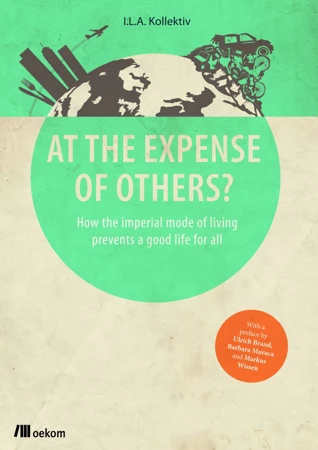Kopp, Becker, Decker, Eicker, Engelmann, Ia Eradze, Forster, Haller, Heuwieser, Hoffmann, Castelos, Podstawa, Shah, Siemons, Wenzel, Wolfinger
I.L.A. Kollektiv,
2019

|
Perspective:
|
Ecological Economics,
Feminist Economics,
Marxian Political Economy
|
| Topic: |
(De-)growth,
Criticism of Capitalism,
Economic History,
Inequality & Class,
Innovation & Technology,
Labour & Care,
Money & Debt,
North-South Relations & Development,
Resources, Environment & Climate,
Social movements & Transformation
|
| page count: |
117 pages
|
Blurb
Today it feels like everybody is talking about the problems and crises of our times: the climate and resource crisis, Greece's permanent socio-political crisis or the degrading exploitative practices of the textile industry. Many are aware of the issues, yet little seems to change. Why is this? The concept of the imperial mode of living explains why, in spite of increasing injustices, no long-term alternatives have managed to succeed and a socio-ecological transformation remains out of sight.
This text presents the concept of an imperial mode of living and explains how our current mode of production and living is putting both people and the natural world under strain. We shine a spotlight on various areas of our daily lives, among them food, mobility and digitalisation. We also look at socio-ecological alternatives and approaches to establish a good life for everyone - instead of for just a few.
Comment from our editors:
This is the first publication of the I.L.A. collective. It introduces the concept of the "imperial mode of living" alongside manifold topics and infographics. The concept itself questions the persistence of the capitalist mode of production and why this dominant mode of production has become so deeply ingrained in Western societies' everyday practices, consumption and lifestyle choices and institutional settings - and still having the capacity to attract the global middle and upper classes. It furthermore problematises the convenient standard of living within advanced capitalist core economies as being based on the systematic exploitation of both labour and nature, i.e. the availability of a cheap workforce in the less developed periphery and of natural resources such as land, fossil fuels or minerals, especially in the peripheral world. It is an excellent material for introducing critical political economy perspectives to a wider non-academic audience.
This material has been suggested and edited by:


